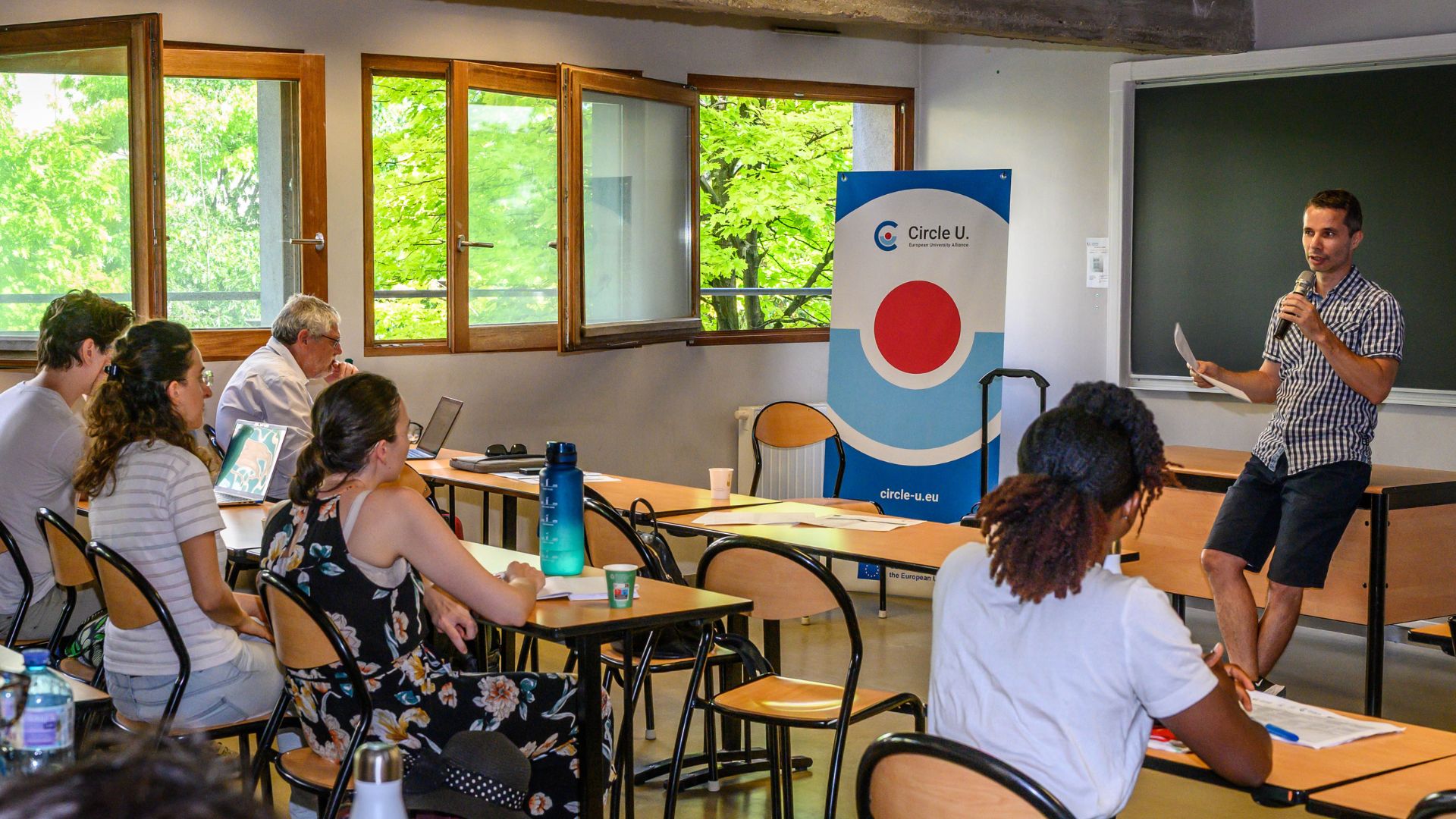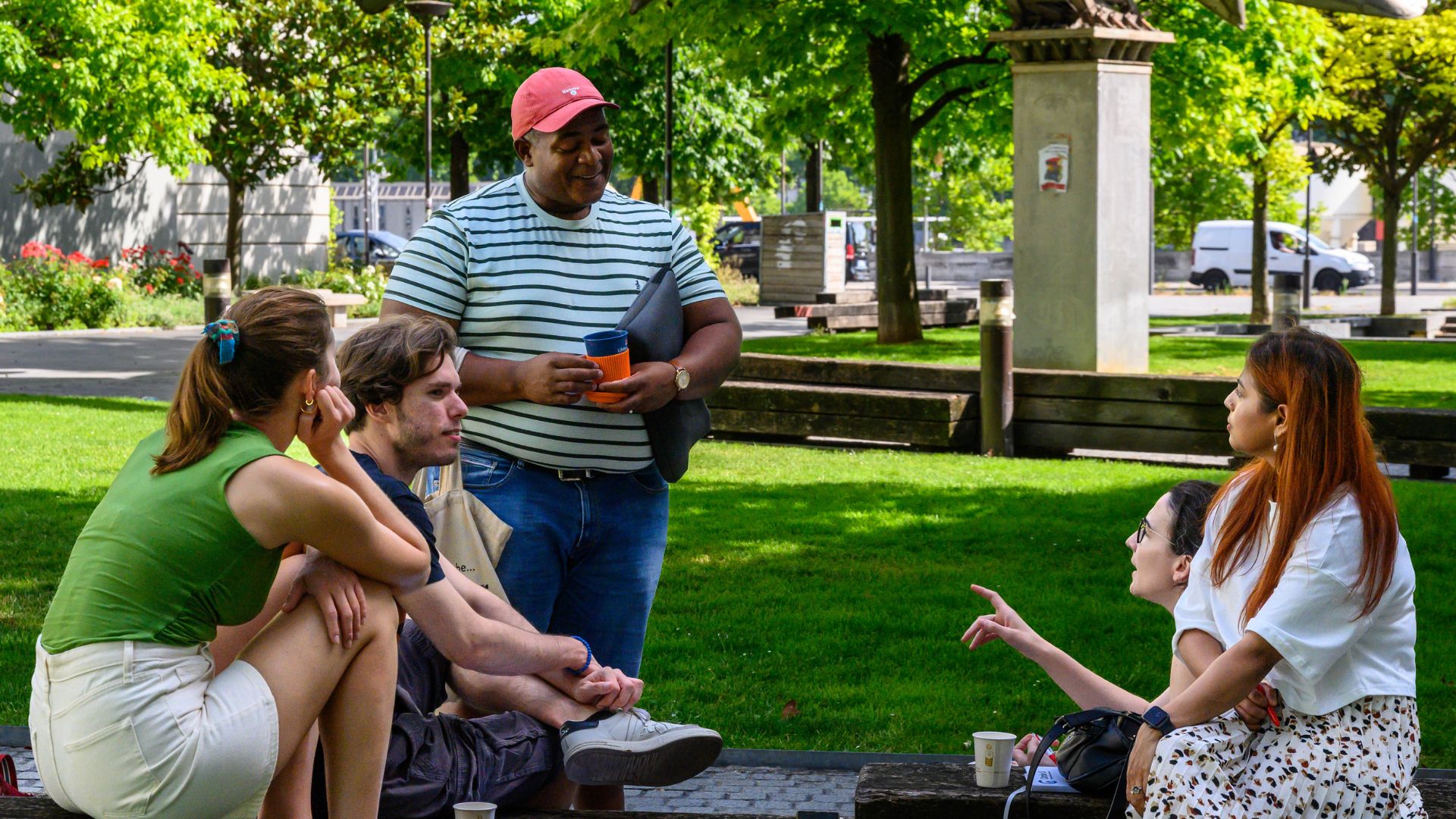ECTS
120 crédits
Niveau d'études visé
BAC +5 (niveau 7)
Durée
2 ans
Faculté
Faculté Sociétés et Humanités
Langue des enseignements
Anglais
Présentation
Presentation
Linguistics aims to identify the common properties of languages by studying their formal features, their history, their diversity, the way they are learned, and the pathologies that can affect them.
The Master's degree in Language Sciences - Grands Moulins Campus offers a training program in Theoretical and Experimental Linguistics and Phonetics (TELPh) that is especially oriented towards research, theorization and experimental analysis of linguistic phenomena.
In addition to providing comprehensive training in the different fields of linguistics, this program offers a thorough introduction to the different experimental methods used to describe linguistic phenomena and a critical discussion of the different linguistic theories adopted in modern linguistics to explain such phenomena.
The program offers solid theoretical training in conjunction with the introduction of advanced experimental methods. Experimental work is carried out in one of the department’s laboratories.
The program combines coursework and research on an MA thesis project, thus allowing students to gain expertise in specific subdisciplines, and preparing them for diverse professional fields: linguistic research, language teaching, professions involving language and speech (e.g., speech therapy), communication, language policy (e.g., regional languages and accents, language contact, multilingualism, European integration), linguistic engineering, and professions involving the acoustic analysis of speech and signal processing techniques adapted for speech recognition
Compétences visées
Targeted competencies
- ability to describe and explain linguistic processes
- ability to conduct original, well-equipped research on language functioning based on a research hypothesis within a precise theoretical framework,
- be able to gather the necessary data (corpus research, psycholinguistic experiments, fieldwork) to analyze linguistic phenomena
- quantitative and qualitative analysis of collected data, analysis of acoustic data on speech, articulation and perception
Programme
Organisation
The Master's program spans two years, divided into four semesters, with each semester corresponding to 30 ECTS credits. The first three semesters consist of on-site courses taught in English, offering a well-rounded curriculum organized into:
1. Fundamentals of linguistics 1, 2 and 3 (42 ECTS across the three semesters)
2. Skills in linguistics 1, 2 and 3 (12-15 ECTS across the three semesters)
3. Broadening in linguistics 1, 2 and 3 (12-15 ECTS across the three semesters)
Two written research dissertations: a short one for the M1 and a more expanded one with a public defence towards the end of the M2.
1. M1 thesis (3 ECTS for preparation in S1 and 9 ECTS in S2)
2. M2 research dissertation (6ECTS thesis preparation in S3 and 30 ECTS in S4)
A research internship is an option during the first year (M1).
Courses in phonetics and phonology are taught at the linguistics department on the campus des Grands Moulins and at the Université Sorbonne Nouvelle – Paris 3.
Our detailed program with course description is available here
For more information : https://u-paris.fr/linguistique/master-sdl/
Sélectionnez un programme
Master 1 SDL - Parcours : Theoretical and Experimental Linguistics and Phonetics
Fundamentals of linguistics 1
15 crédits150hAu choix : 5 parmi 6
Phonetics
3 crédits30hPhonology
3 crédits30hMorphology
3 crédits30hSyntax
3 crédits30hSemantics
3 crédits30hLinguistic typology
3 crédits30h
Skills in linguistics
6 crédits36hAu choix : 2 parmi 3
Data and corpora
3 crédits18hEthics and Experimental Design
3 crédits18hField Linguistics / Describing and documenting endangered languages
3 crédits18h
Broadening 1
6 créditsAu choix : 2 parmi 4
UE Transverse UPCité - Engagement
3 créditsUE Transverse UPCité - Sport
3 créditsUE Libre (Circle U, Smarts UP, etc.)
3 créditsBroadening in linguistics
3 crédits24hAu choix : 1 parmi 9
Speech Perception
3 crédits24hHistory of Linguistic Theories
3 crédits24hLa linguistique à la croisée des disciplines
3 crédits24hEast Asian Linguistics
3 crédits24hMeaning matters
3 crédits24hSign language linguistics
3 crédits24hPsycholinguistics
3 crédits24hLanguage and Gender
3 crédits24hRomance linguistics
3 crédits24h
M1 Thesis
3 crédits18hM1 Thesis preparation
3 crédits18h
Fundamental of linguistics 2
12 crédits120hAu choix : 4 parmi 7
Phonological Analysis
3 crédits30hExperimental Phonology
3 crédits30hTheoretical Morphology
3 crédits30hConstraint-based syntax
3 crédits30hTopics in Minimalist Syntax
3 crédits30hSemantic Analysis
3 crédits30hPragmatics
3 crédits30h
Skills in linguistics 2
3 crédits18hAu choix : 1 parmi 2
Bases of Programming
3 crédits18hIntroduction to Statistics
3 crédits18h
Broadening 2
6 crédits48hAu choix : 2 parmi 4
Tense, Aspect, Modality
3 crédits24hDiachrony and Reconstruction
3 crédits24hProsodic Analysis
3 crédits24hLanguage Acquisition
3 crédits24h
Master Thesis
9 crédits12hM1 Thesis
9 crédits12hFacultatif
Master 2 SDL - Parcours : Theoretical and Experimental Linguistics and Phonetics
Fundamentals of linguistics 3
15 crédits150hAu choix : 5 parmi 9
Topics in Phonological Theories
3 crédits30hAdvanced Morphology
3 crédits30hTopics in Prosody
3 crédits30hExperimental Syntax
3 crédits30hAdvanced syntax: theory and research
3 crédits30hTopics in Semantics and Pragmatics
3 crédits30hSignal processing and computational methods for speech
3 crédits30hHistory and epistemology of linguistic sciences
3 crédits30hTopics in Chinese lingusitics
3 crédits30h
Skills in linguistics 3
3 crédits18hAu choix : 1 parmi 3
Corpora / Field linguistics
3 crédits18hAu choix : 1 parmi 2
Data and corpora
3 crédits18hField Linguistics / Describing and documenting endangered languages
3 crédits18h
Ethics and Experimental Design
3 crédits18hAdvanced Statistics
3 crédits18h
Broadening 3
6 créditsAu choix : 2 parmi 7
UE Transverse UPCité - Engagement
3 créditsUE Transverse UPCité - Sport
3 créditsUE Libre (Circle U, Smarts UP, etc.)
3 crédits1 UE Fundamentals of linguistics 1 (non choisie au Semestre 1)
3 créditsAu choix : 1 parmi 6
Phonetics
3 crédits30hPhonology
3 crédits30hMorphology
3 crédits30hSyntax
3 crédits30hSemantics
3 crédits30hLinguistic typology
3 crédits30h
1 UE Fundamentals of linguistics 3 (non choisie au Semestre 3)
3 créditsAu choix : 1 parmi 9
Topics in Phonological Theories
3 crédits30hAdvanced Morphology
3 crédits30hTopics in Prosody
3 crédits30hExperimental Syntax
3 crédits30hAdvanced syntax: theory and research
3 crédits30hTopics in Semantics and Pragmatics
3 crédits30hSignal processing and computational methods for speech
3 crédits30hHistory and epistemology of linguistic sciences
3 crédits30hTopics in Chinese lingusitics
3 crédits30h
1 ECUE au sein de l'UE Broadening in linguistics (non choisie au semestre 1)
3 créditsAu choix : 1 parmi 9
Speech Perception
3 crédits24hHistory of Linguistic Theories
3 crédits24hLa linguistique à la croisée des disciplines
3 crédits24hEast Asian Linguistics
3 crédits24hMeaning matters
3 crédits24hSign language linguistics
3 crédits24hPsycholinguistics
3 crédits24hLanguage and Gender
3 crédits24hRomance linguistics
3 crédits24h
1 UE Skills in linguistics 3 (non choisie au semestre 3)
3 crédits24hAu choix : 1 parmi 3
Corpora / Field linguistics
3 crédits18hAu choix : 1 parmi 2
Data and corpora
3 crédits18hField Linguistics / Describing and documenting endangered languages
3 crédits18h
Ethics and Experimental Design
3 crédits18hAdvanced Statistics
3 crédits18h
Thesis
6 crédits18hM2 Thesis preparation
6 crédits18h
Master Thesis
30 créditsM2 Thesis
30 crédits
Stages et projets tutorés
Internship
The internship in the Theoretical and Experimental Linguistics and Phonetics (TELPh) programme is optional and lasts a minimum of 70 hours (i.e. two weeks full-time). It is validated after the student has written a report. The internship can be with a company, a language school or a research laboratory, depending on the student's personal and professional project, but always in relation to linguistics.
Contrôle des connaissances
Assessment of knowledge and skills
For details of how knowledge and skills are tested, please contact the UFR (see link for more information).
First session: continuous assessment (CCI - Contrôle Continu Intégral or CET - Contrôle continu avec Examen Terminal)
Graduation: average of 4 semesters
Minimum grade: 7/20 for all UEs
Second chance session: if grade < 10/20
Honors threshold:
- *no honors: 10/20 ≤ grade < 12/20
- *Mention “ Assez Bien ” : 12/20 ≤ Note < 14/20
- *Mention “ Bien ” : 14/20 ≤ Note < 16/20
- *Mention “ Très Bien ” : Note >16/20
Aménagements particuliers
Admission
Public cible
Targeted audience
Students who are geared towards research in linguistics and aspire to become professionals in languages.
For an M1 admission, you will need:
- BA/Licence 3e année Sciences du Langage, "Language Sciences" at Université Paris Cité
- BA/Licence 3e année Sciences du Langage, "Language Sciences" or Lettres option Sciences du Langage from another university
- Other BA/licence in:
- Literature, Philosophy, or Languages with a specialisation in language sciences
- other
For an M2 admission, the same is required as for the M1 in addition to justifying an M1 qualification
Conditions d'admission
Admission criteria
The admission is conditioned on a level in English allowing you to read and summarise an article and to understand a scientific discussion in English. French qualifications are not required.
To access the M1, students who cannot justify a previous experience/qualification in Language Sciences in their BA are encouraged to explicitly state their knowledge and/or any previous course-work in any branch of linguistics.
Pré-requis
Prerequisits
- Overall average of 12/20 as a minimum in their BA (a necessary but not a sufficient condition)
- Ability to read a text in English and to follow a scientific discussion in English
Modalités de candidature
Application procedure
All necessary information related to the admission procedure can be found here.
For professionals, specific admission criteria can apply and these can be found here.
The application form contains all documents justifying your qualifications, a CV and a motivation letter explaining your interest and your research project.
Droits de scolarité
Tuition fees
National tuition fees are set annually by the “Ministère de l'Enseignement Supérieur et de la Recherche”.
Fees may vary according to the student's individual situation.
Et après ?
Poursuites d'études
PhD studies
- Doctoral School of Language Sciences (Université Paris Cité) or elsewhere in France or abroad
- Preferred research units: LLF (UMR CNRS-Université Paris Cité), HTL (UMR CNRS-Université Paris Cité), ALTAE (URP)
Passerelle
Program transfer
Students have the possibility to transfer (‘réorientation’) to other Language sciences Master programs at Université Paris Cité: Computational Linguistics, French as a Foreign Language Engineering, or LOGOS.
Insertion professionnelle
Taux insertion professionnelle 100%
*Enquête du MESRI sur les diplômés 2019, 30 mois après obtention du diplôme.
|
Effectif des diplômés |
Effectif des répondants |
Taux de réponse |
Part des diplômés en formation initiale |
Part des diplômés en formation apprentissage |
Part des diplômés en formation continue |
|
8 |
5 |
63% |
100% |
- |
- |
|
Part des cadres et des professions intermédiaires |
Part des emplois stables |
Part des emplois à plein temps |
Part des emplois en adéquation avec le niveau d'études |
Part des emplois en adéquation avec la formation suivie |
|
50% |
33% |
100% |
100% |
100% |
Débouchés professionnels
Career opportunities
- Research in linguistics and university-level teaching positions
- Publishing and editing professions
- Teaching positions in schools, concours
Référentiel
Référentiel ROME
- Communication
- Conception de contenus multimédias
- Conseil en formation
- Coordination pédagogique
- Coordination d'édition
- Enseignement supérieur
- Enseignement général du second degré
- Enseignement des écoles
- Formation professionnelle
- Réalisation de contenus multimédias
- Orthophonie
Référentiel RNCP
38696
International
Mobilité internationale
International mobility
Possibility of mobility within the Erasmus program or within an international exchange agreement.
« Erasmus+ » partners:
Universität des Saarlandes (Allemagne), Universität Stuttgart (Allemagne), Eberhard Karls Universität Tübingen (Allemagne), Universiteit Antwerpen (Belgique), Université Libre de Bruxelles (Belgique), Universiteit Gent (Belgique), Université Catholique de Louvain (Belgique), Universidad del País Vasco / Euskal Herriko Unibertsitatea (Espagne), Università degli Studi di Roma 'Tor Vergata' (Italie), Università degli Studi di Roma 'La Sapienza' (Italie), Trinity College Dublin (Irelande), Radboud Universiteit Nijmegen (Pays-Bas), Uniwersytet Marii Curie-Sklodowskiej (Pologne), Universitatea din Bucuresti (Roumanie), University of Edinburgh (Royaume-Uni), Univerzita Karlova v Praze (République Tchèque), Univerzita Karlova v Praze (République Tchèque)
Partners with bilateral agreements (« accords bilatéraux ») :
University of Chicago (USA), Tulane University (USA), University of Melbourne (Australie), Université de Sao Paolo (Brésil), Université d’Etat de la Région de Moscou (MGOU) (Russie), Universités de Sogang (Corée), Seoul National University (Corée), National Taiwan Normal University (Taiwan, ROC)
Contacts
Dernière mise à jour le 12 novembre 2025
A lire aussi
À l’occasion de la Semaine nationale des Cordées de la réussite 2026, l’Université Paris Cité réaffirme son engagement en faveur de la démocratisation de l’accès à l’enseignement supérieur à travers des actions concrètes, innovantes et ancrées dans les territoires.
Étudiantes et étudiants de l’Université Paris Cité, nous vous donnons rendez-vous le jeudi 19 mars 2026 pour la 2ᵉ édition de cet événement annuel dédié à l’emploi, aux stages et à l’alternance. Près de 30 recruteurs seront présents pour vous proposer des opportunités concrètes et des conseils personnalisés afin de faciliter votre insertion professionnelle. Nouveauté cette année : le Forum des métiers de la transition écologique et de la solidarité vous invitera à réfléchir aux enjeux de l’engagement écologique et solidaire dans le monde du travail au travers de conférence, ateliers et tables rondes.
Vous étudiez à l’Université Paris Cité et vous souhaitez profiter de vos vacances d’été pour renforcer votre CV tout en découvrant un nouveau pays ? Notre université est membre de l’alliance européenne Circle U. et vous permet, à travers son campus ouvert, de candidater gratuitement aux écoles d’été organisées chaque année. Plusieurs thématiques transverses sont abordées comme la Santé Globale, le Climat, la Démocratie ou le Multilinguisme par exemple. Les candidatures sont ouvertes jusqu’au 28 février, renseignez-vous !
Vous êtes doctorant ou doctorante à l’Université Paris Cité et vous souhaitez étendre votre réseau et vos connaissances en Santé Globale ? L’alliance européenne Circle U. vous invite à participer à la nouvelle édition de son école d’été « New avenues for Global Health » qui aura lieu du 6 au 11 juillet 2026 dans les locaux de notre université ! Les candidatures sont acceptées jusqu’au 28 février.







